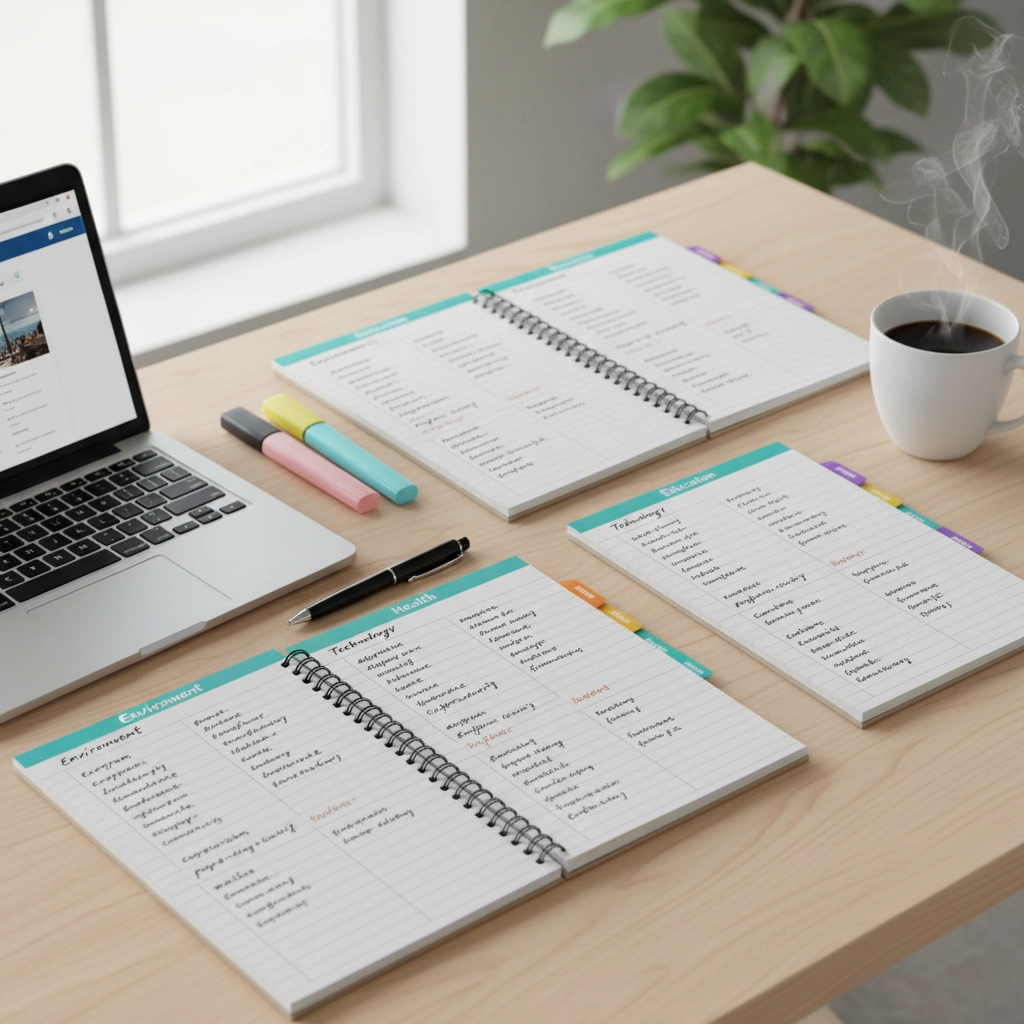Contents
ToggleGetting that Band 7+ score on your IELTS exam? It's absolutely achievable, and I'm here to help you unlock one of the most powerful tools in your arsenal: advanced vocabulary for IELTS.
In my experience working with countless IELTS students, I've seen how the right vocabulary can completely transform their scores. The secret isn't cramming thousands of obscure words. It's about understanding exactly what examiners want and delivering it with confidence.
Let's dive into the vocabulary strategies that will elevate your IELTS performance across all four modules.
Why Advanced Vocabulary Is Your Secret Weapon
Here's something many students don't realize: vocabulary accounts for 25% of your total score in both Writing and Speaking sections. That's a quarter of your entire grade! But here's the good news – improving your vocabulary for IELTS preparation is one of the most controllable aspects of your exam performance.
I've watched students jump from Band 6 to Band 8 simply by mastering the right approach to advanced IELTS vocabulary. It's not about showing off with complicated words. It's about demonstrating precision, variety, and natural English usage.
The IELTS examiners are looking for four key things in your vocabulary:
- Range – Can you use different words for the same concept?
- Accuracy – Do you use words correctly?
- Appropriateness – Do your word choices fit the context?
- Flexibility – Can you paraphrase and avoid repetition?
Master these four elements, and you're well on your way to that high score.
The Four Types of Vocabulary That Impress Examiners
Let me share what I've learned from years of IELTS preparation: not all advanced vocabulary is created equal. Here are the types that will boost your band score:

Powerful Synonyms and Paraphrasing
This is where most students miss golden opportunities. Instead of repeating basic words, show your range with sophisticated alternatives:
- Instead of "big": substantial, considerable, vast, extensive, significant
- Instead of "important": crucial, essential, fundamental, vital, pivotal
- Instead of "problem": issue, challenge, dilemma, predicament, obstacle
I always tell my students: every time you catch yourself about to repeat a word, pause and ask, "How can I say this differently?"
Less Common but Natural Words
These are vocabulary for IELTS speaking and writing that sound sophisticated without being pretentious:
- Meticulous (extremely careful and precise)
- Ubiquitous (present everywhere)
- Pervasive (spreading widely throughout)
- Discern (recognize or identify)
- Alleviate (make less severe)
The key is using them naturally. If a word feels forced, choose something simpler that you can use confidently.
Collocations That Sound Native
Collocations are word partnerships that native speakers use together. They're absolute gold for your IELTS high score tips:
- Make a decision (not "do a decision")
- Heavy rain (not "strong rain")
- Undergo treatment (not "take treatment")
- Raise awareness (not "make awareness")
Strategic Idioms and Phrasal Verbs
Use these sparingly in Speaking, and avoid them entirely in Academic Writing:
- "Break new ground" (pioneer something)
- "Bridge the gap" (connect different things)
- "Come to terms with" (accept a difficult situation)
Remember: only use idioms you're 100% confident about. A misused idiom will hurt your score more than simple vocabulary used correctly.
Topic-Specific Band 7+ Vocabulary IELTS Success
Let's get practical. Here are advanced words organized by common IELTS topics:

Environment and Climate
- Sustainability, biodiversity, ecosystem, conservation
- Carbon footprint, renewable energy, deforestation, urbanization
- Mitigate, exacerbate, irreversible, unprecedented
Technology and Innovation
- Breakthrough, advancement, digitalization, automation
- Revolutionary, cutting-edge, obsolete, unprecedented
- Facilitate, streamline, optimize, integrate
Education and Learning
- Curriculum, pedagogy, academia, comprehensive
- Foster, cultivate, enhance, stimulate
- Proficiency, competency, literacy, aptitude
Health and Lifestyle
- Well-being, preventive, holistic, sedentary
- Nutritious, detrimental, beneficial, therapeutic
- Epidemic, chronic, acute, rehabilitation
Society and Culture
- Diversity, integration, discrimination, inequality
- Traditional, contemporary, conservative, progressive
- Perspective, values, customs, heritage
In my experience, students who organize their vocabulary study around these topics see faster improvement than those who study random word lists.
Proven Study Strategies That Actually Work
Here's what I've seen work consistently with my students:
The Context Method
Never learn words in isolation. Every time you encounter a new word:
- Read the full sentence where you found it
- Write your own example using the word
- Note any collocations or word partnerships
- Practice using it in conversation or writing
Topic-Based Vocabulary Journals
Create separate sections for each IELTS topic. When you learn "substantial" in an environmental context, write it in your Environment section with the example sentence. This builds stronger mental connections.
The 24-Hour Review System
This is incredibly powerful for vocabulary for IELTS writing improvement:
- Learn 5-7 new words today
- Review them after 1 hour
- Review again after 24 hours
- Use them in writing within 48 hours
Active Reading for Academic English Words
Read materials slightly above your current level – BBC News, The Guardian, National Geographic. When you encounter unfamiliar words:
- Try to guess the meaning from context
- Check your guess with a dictionary
- Add successful guesses to your vocabulary journal
This builds both vocabulary and reading skills simultaneously.
Common Vocabulary Mistakes That Kill Your Score
I've seen these errors countless times, and they're completely avoidable:

Overusing Complex Words
Some students think more complex always means better. Wrong! Examiners spot forced vocabulary immediately. Use advanced words only when they genuinely improve your expression.
Poor: "The ubiquitous proliferation of technological innovations has engendered multifarious ramifications."
Better: "The widespread growth of technology has created various consequences."
Incorrect Word Forms
Master different forms of the same word:
- Economy (noun) → Economic (adjective) → Economically (adverb)
- Analyze (verb) → Analysis (noun) → Analytical (adjective)
Wrong Register
Academic Writing requires formal vocabulary. Speaking allows more conversational choices. Don't mix them up!
Pronunciation Problems in Speaking
If you can't pronounce a word correctly, don't use it in Speaking. Practice pronunciation of your advanced vocabulary regularly.
Using Vocabulary Strategically in Each IELTS Section
IELTS Writing Task 1
Focus on precise descriptive language:
- Trends: surge, plummet, fluctuate, stabilize
- Comparisons: substantially higher, marginally lower, considerably more
- Time periods: throughout the period, subsequently, initially
IELTS Writing Task 2
Build strong arguments with:
- Opinion language: fundamentally, undoubtedly, arguably, presumably
- Cause and effect: consequently, thereby, hence, thus
- Contrast: nevertheless, nonetheless, conversely, alternatively
IELTS Speaking
Show natural fluency with:
- Fillers: actually, essentially, basically (use sparingly!)
- Personal opinions: personally, from my perspective, in my view
- Experiences: I've encountered, I've witnessed, I've observed
IELTS Reading and Listening
Build comprehension through:
- Understanding synonyms in questions and passages
- Recognizing paraphrasing patterns
- Contextual vocabulary inference skills
Your Next Steps to Vocabulary Success
Remember, improving your IELTS vocabulary isn't about memorizing endless lists. It's about strategic, focused learning that builds genuine English proficiency.
Start with the topic areas most relevant to your interests and career goals. Use the context method for every new word you learn. Practice actively through writing and speaking, not just passive recognition.
I've seen students achieve remarkable score improvements by following these strategies consistently. The key is patience and systematic practice. Your vocabulary will grow stronger each day, and so will your confidence.
Make sure to track your progress and celebrate small victories along the way. Every new word mastered is a step closer to your target band score.
Your IELTS success story starts with the vocabulary choices you make today. Keep learning, keep practicing, and remember – you've got this!





